8 transitional decorating ideas – how interior designers mix old and new to create classic style for every room
Be inspired by the design experts – their 8 top tips for perfecting the art of transitional decorating around the home

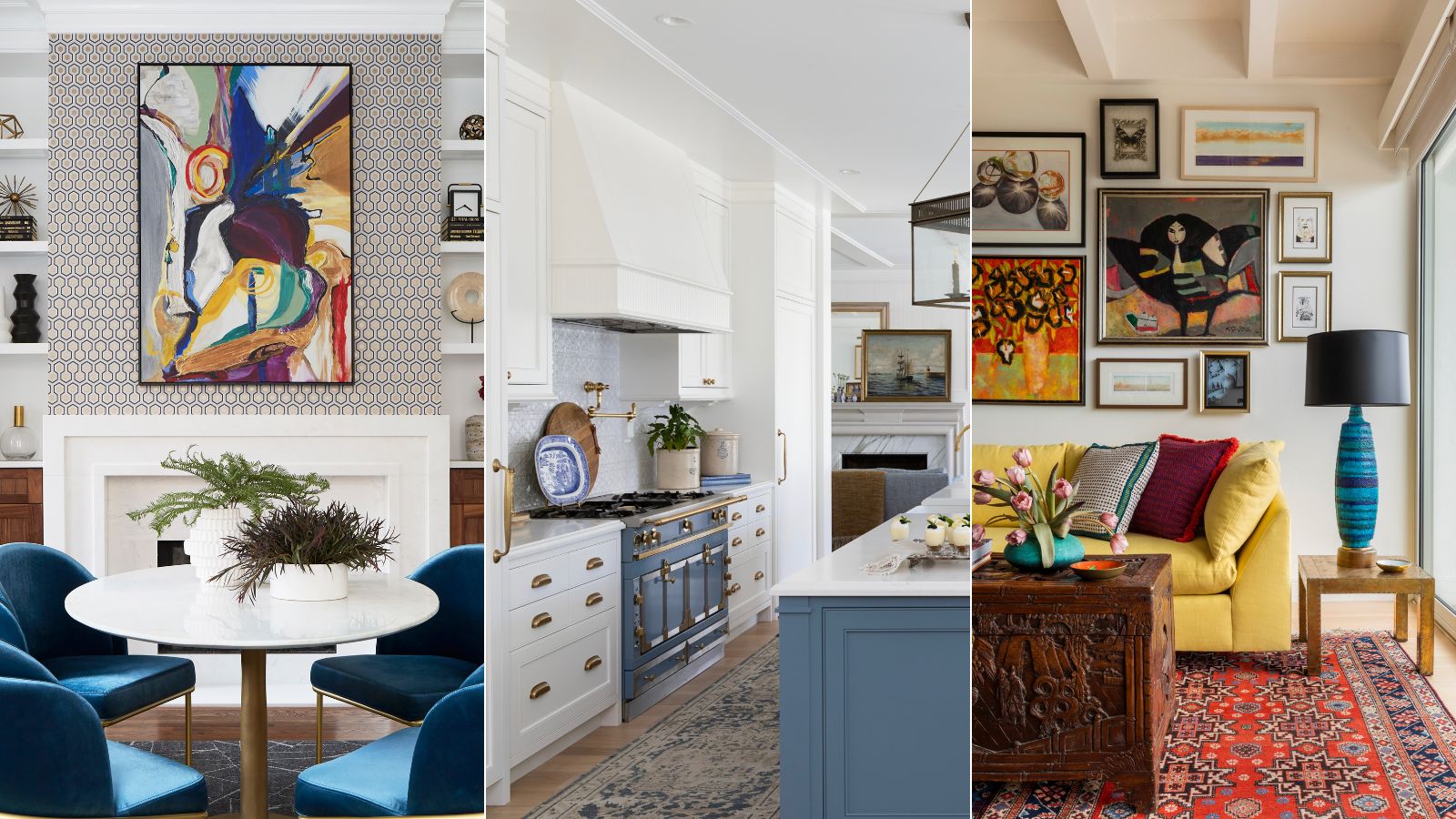
- 1. Soften a kitchen with vintage furnishings and accessories
- 2. Dine in style – transitional style
- 3. Mix unexpected modern pieces with traditional features
- 4. Bring in bold colors, graphic shapes and pattern
- 5. Link old and new with a modern reflection of original features
- 6. Look to artworks and sculptures to add heritage to a contemporary kitchen
- 7. Try old and new side by side in a foyer
- 8.Pair bright, modern upholstery with classic antiques
Design expertise in your inbox – from inspiring decorating ideas and beautiful celebrity homes to practical gardening advice and shopping round-ups.
You are now subscribed
Your newsletter sign-up was successful
Want to add more newsletters?

Twice a week
Homes&Gardens
The ultimate interior design resource from the world's leading experts - discover inspiring decorating ideas, color scheming know-how, garden inspiration and shopping expertise.

Once a week
In The Loop from Next In Design
Members of the Next in Design Circle will receive In the Loop, our weekly email filled with trade news, names to know and spotlight moments. Together we’re building a brighter design future.

Twice a week
Cucina
Whether you’re passionate about hosting exquisite dinners, experimenting with culinary trends, or perfecting your kitchen's design with timeless elegance and innovative functionality, this newsletter is here to inspire
We can't help but notice. Everyone in interior design is talking about transitional decorating ideas – mixing old and new styles to create elegant, timeless room schemes.
To find out what all the fuss is about we asked interior design experts for their take on the transitional design zeitgeist, and persuaded them to share their favorite transitional decorating ideas to inspire us. Their tried and tested suggestions for enduring style bring together traditional and modern elements, and contrasting and complementary design elements, to create classic looks for any space.
Transitional decorating ideas
Transitional decorating is essentially the idea of blending old and new, or elements from different eras and styles of decor in a room scheme to create a classic look. For instance, styling a super-sleek contemporary kitchen with vintage dining furniture or an antique rug to bridge the timeline. Or using a traditional print wallpaper to add character to a living room with modern sofas.
Expect to see contrast but prepare to be surprised by how the differing elements in transitional decorating schemes can also complement one another to give a richly layered effect. And the best thing about transitional decorating ideas? These are looks that can't really go out of fashion since they're not wedded to just one singular passing trend.
Check out the designers' suggestions below, to see how the experts embrace transitional design in their decorating ideas. Their stylish solutions will inspire you to make changes all around the home.
1. Soften a kitchen with vintage furnishings and accessories
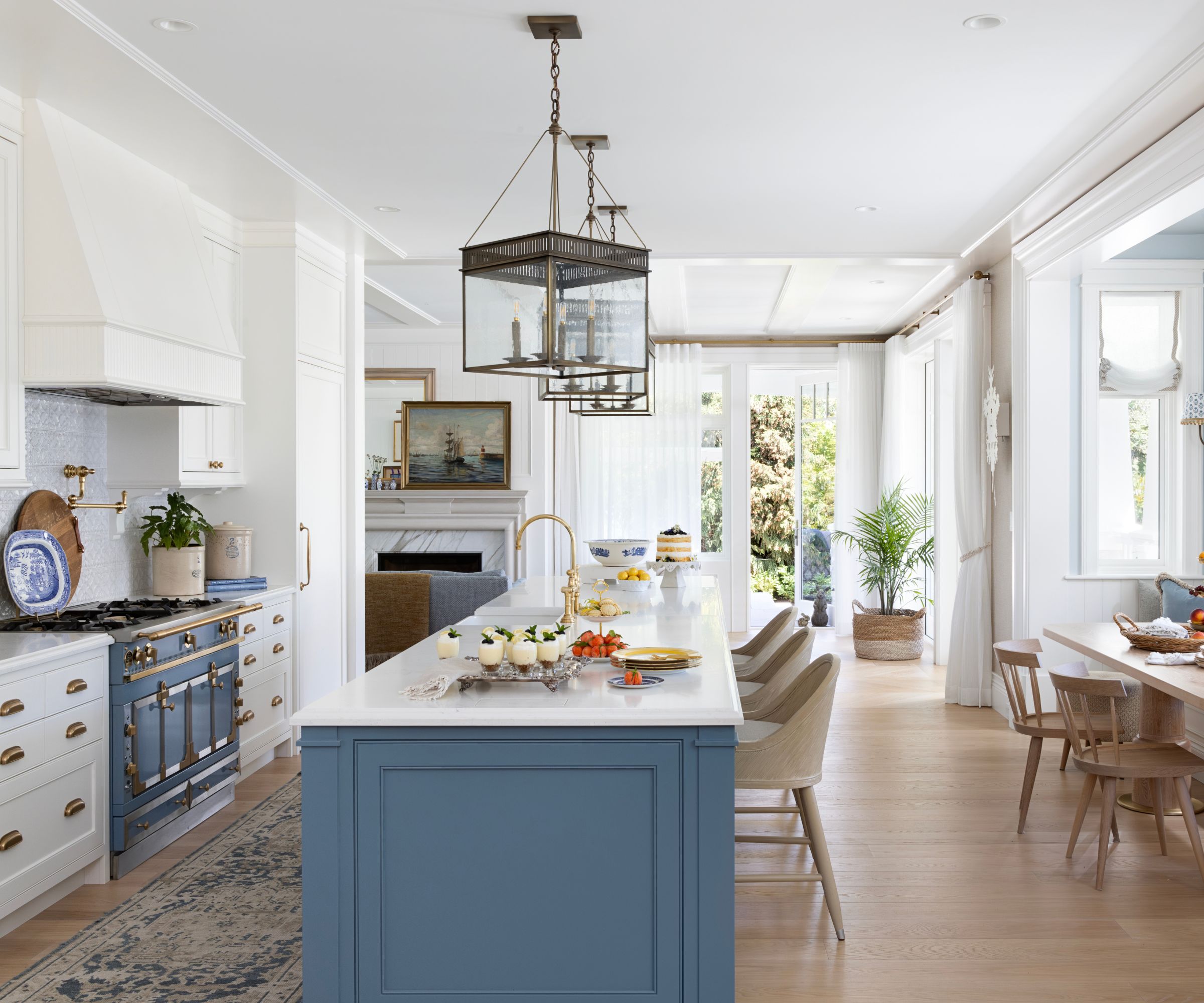
How often have you heard the kitchen referred to as the heart of the home? Yet how often is this key room overlooked when it comes to adding personality with meaningful decorative details? Without these more individual and personal elements in your kitchen ideas, the kitchen risks feeling sterile, empty, and unwelcoming.
A kitchen needs to be clean, tidy and organized but if it's going to be the heart of the home it should be wearing its heart on its sleeve, with a little soul thrown in for good measure. The perfect way to do this is by embracing transitional kitchen ideas.
Design expertise in your inbox – from inspiring decorating ideas and beautiful celebrity homes to practical gardening advice and shopping round-ups.
That's certainly the view of Vancouver-based interior designer Kelly Deck, who created the kitchen above. 'We thrive on creating interiors that feel well-established and collected. In this new kitchen, we specifically selected plumbing and hardware in an unlacquered brass finish because it patinas over time and gives the home a relaxed, lived-in feeling,' says Kelly. 'We selected light fixtures that are historically inspired and beautifully crafted. In furnishings and decor, we like to incorporate vintage accents such as the antique crocks and plate ware that are displayed on the counters here.'
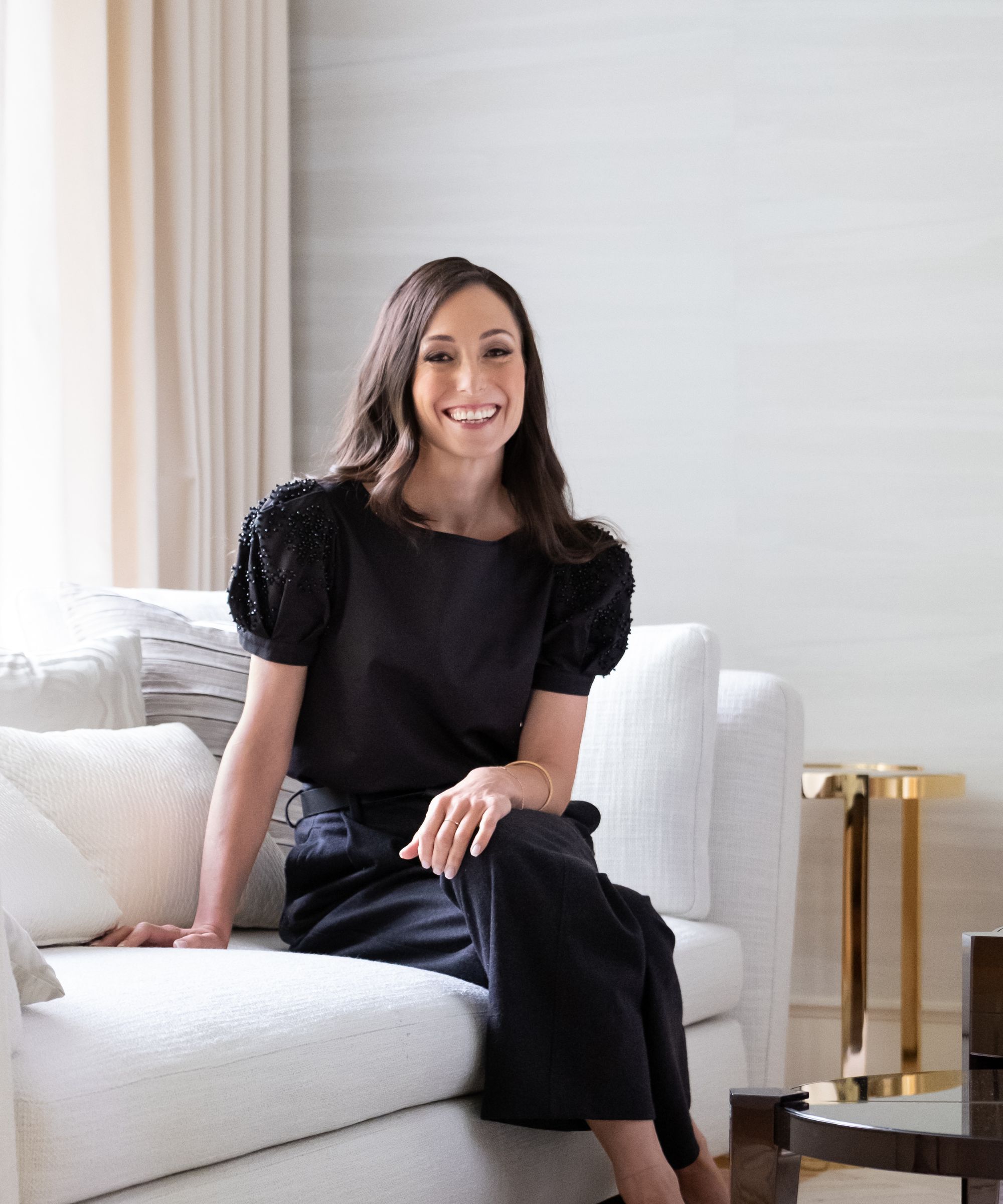
For more than two decades, Kelly Deck and her team have artfully designed estate homes in the Pacific Northwest and beyond, earning international acclaim for their detailed and exquisite approach to creating interiors.
2. Dine in style – transitional style
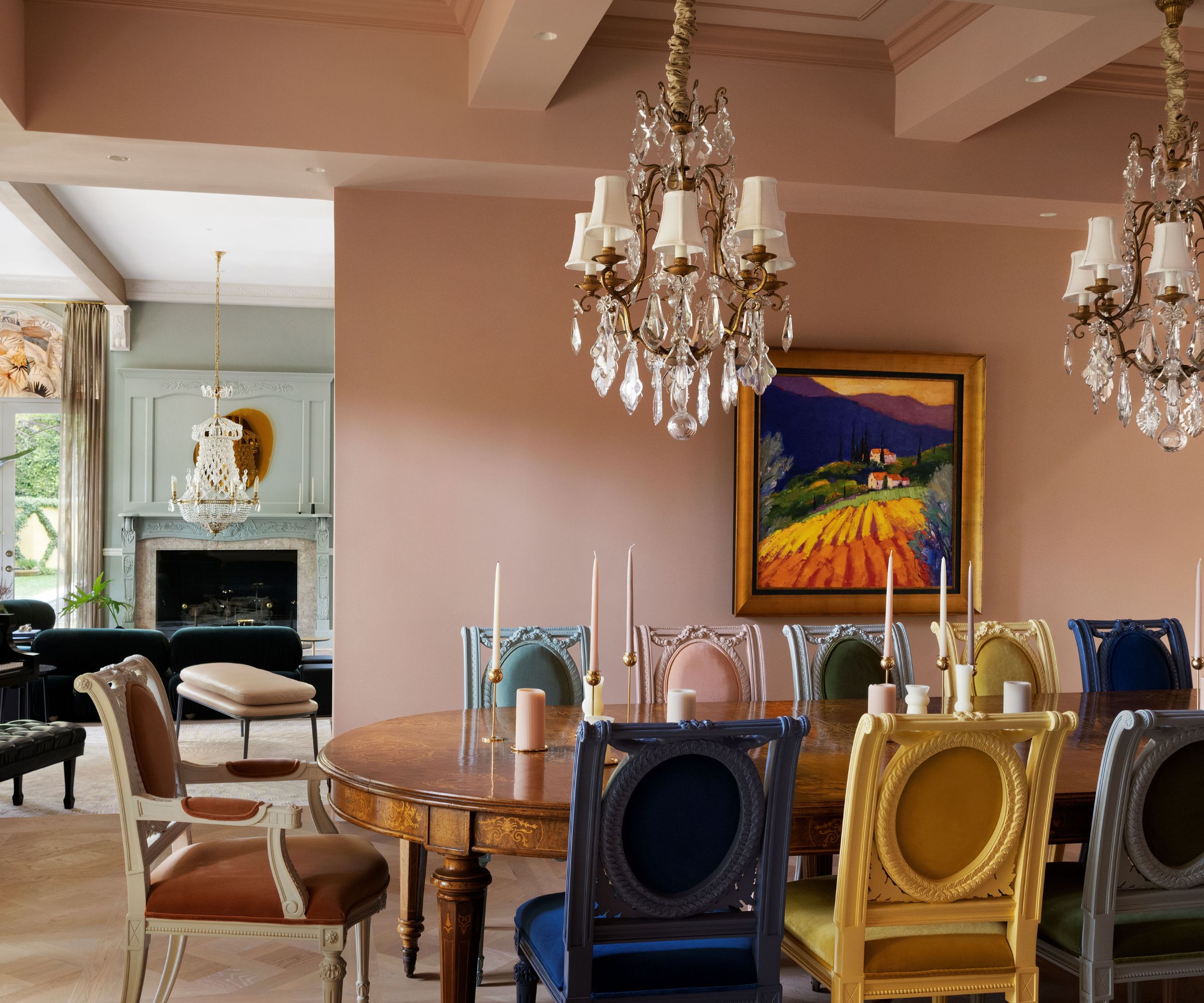
Mixing traditional and contemporary styles not only adds heart and soul to a space, but can give it a sense of humor too. Interior designer Tancred Vilucchi is a big advocate of transitional decorating schemes with an eclectic mix of styles and eras. In his LA dining room scheme, above, dinner guests are entertained in a truly luxurious setting, and the dining room ideas feature a mix of antiques and modern furnishings and a generous side serving of fun.
'This project is a one-of-a-kind home, where every space tells a visual story and where exuberance, surrealism, and colors meet in harmony,' says Tancred. 'Taking advantage of the contrast between old and new, offering a second life to an object, a piece of furniture or a light fixture, results in designing an eclectic and timeless atmosphere.'
An antique dining table and chandelier are mixed with fresh pops of color and modern chairs. 'The beautiful dining table was a must-keep in the design scheme. We paired it with old dining chairs that we have completely refurbished, spray painted in different colors, and upholstered with matching velvet inspired from the painting that is now hanging on the wall,' adds the designer, who specified different shades of vintage pink for the spray-painted walls, trims and ceilings. 'This creates warmth and balance, and contrasts with the old chandelier, to which we added new, modern-style shades. The finished room scheme achieves an overall surreal style, yet transitional and timeless.'
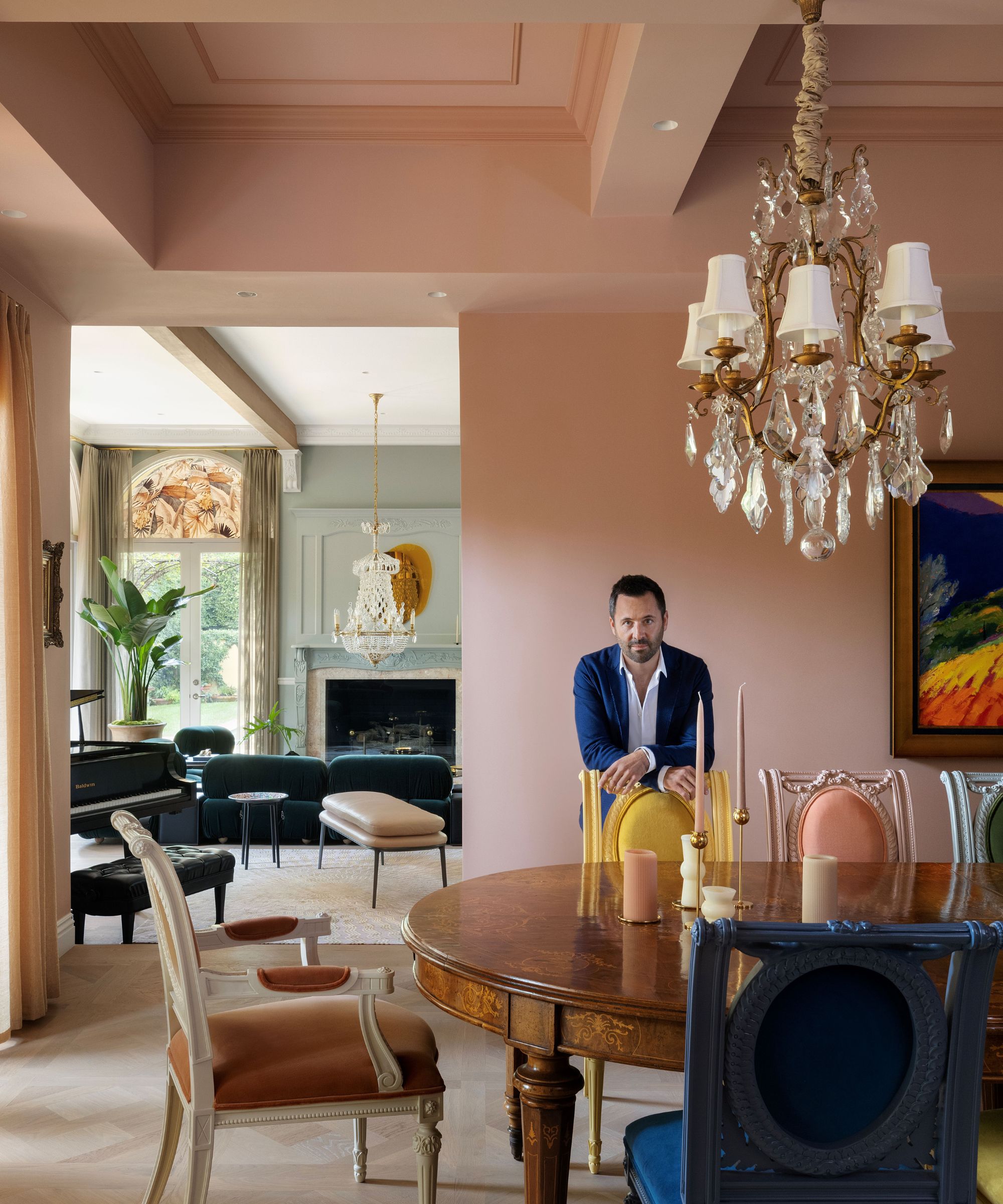
French-Italian designer and builder Tancred Vilucchi is based in Los Angeles and draws on his European heritage in all his work. 'Creating a high-level visual unity while sublimating an old piece with a modern one, is an exercise we love doing at Maison Vilucchi,' he says.
3. Mix unexpected modern pieces with traditional features
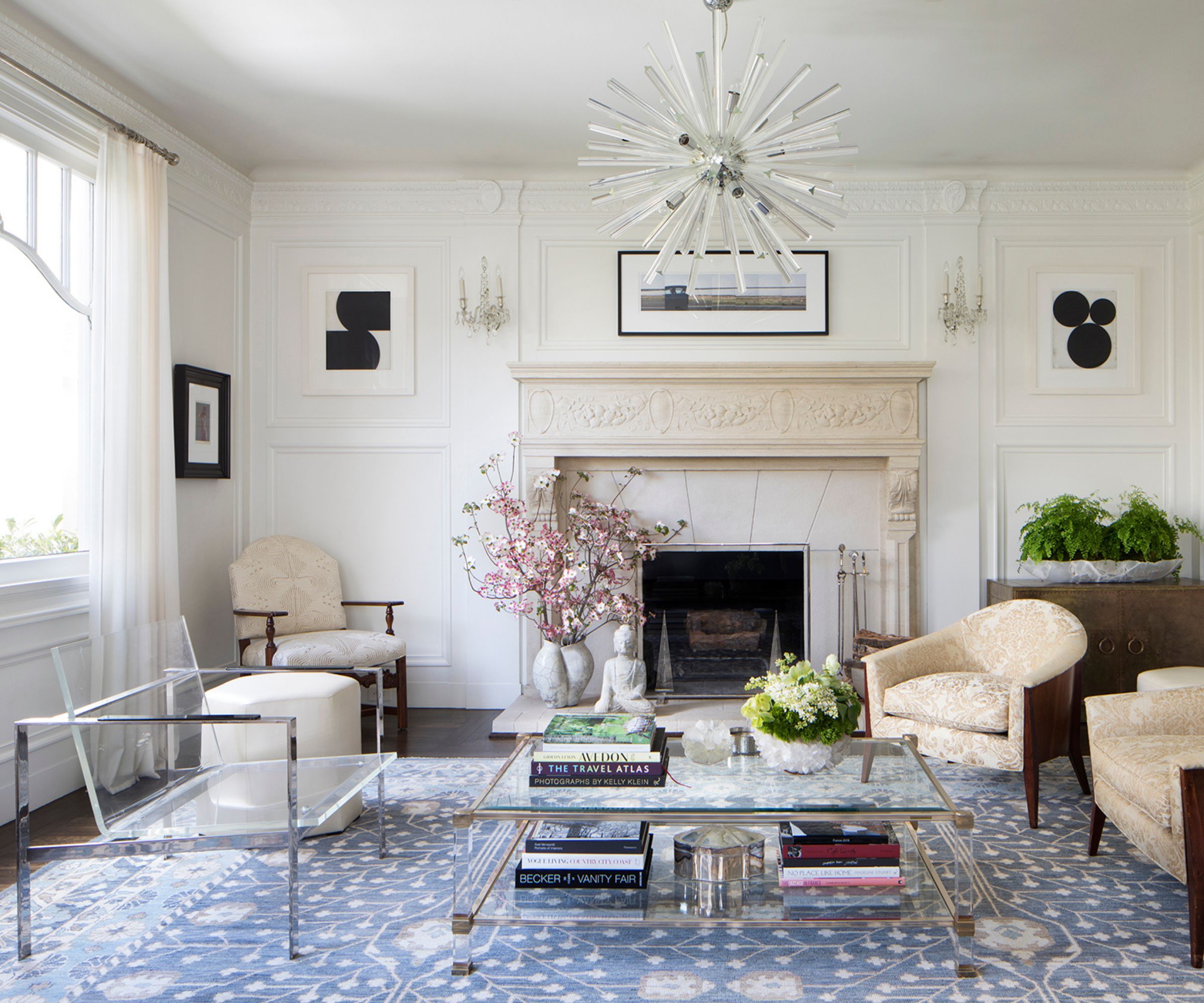
For San Francisco-based interior designer Kendall Wilkinson, applying a label to a decorating style is far less important than achieving a balanced room scheme with well-chosen furnishings.
'As designers, we often shy away from the term transitional as it feels like a convenient catchphrase for an exciting design that brilliantly and thoughtfully mixes old and new, classic and contemporary,' says Kendall. 'All design is essentially transitional because we design for each client's personality and uniqueness. For us, the art of design is in the mix.'
The living room ideas in designer Kendall's own home, pictured above, feature a collection of furniture, art, antiques, and accessories. 'These are things that I love, that have intrinsic value, and that, when balanced, well, all good things go together,' she says. The furnishings are all balanced against the elegant backbone of the 100-year-old home. 'I kept all the original wood moldings, mantle, fire surround, and floors but modernized them with clean paint,' she adds.
Kendall suggests reupholstering vintage chairs in new and tactile fabrics to bring new life to antique items and integrate them into your design plan. 'In my living room I have a mix of vintage chairs, from a lucite piece to a pair of French chairs and an extraordinary chair (in the corner of the room) gifted to me from the former owner, and designed and made for this home by architect Alfred Henry Jacobs in 1915.'
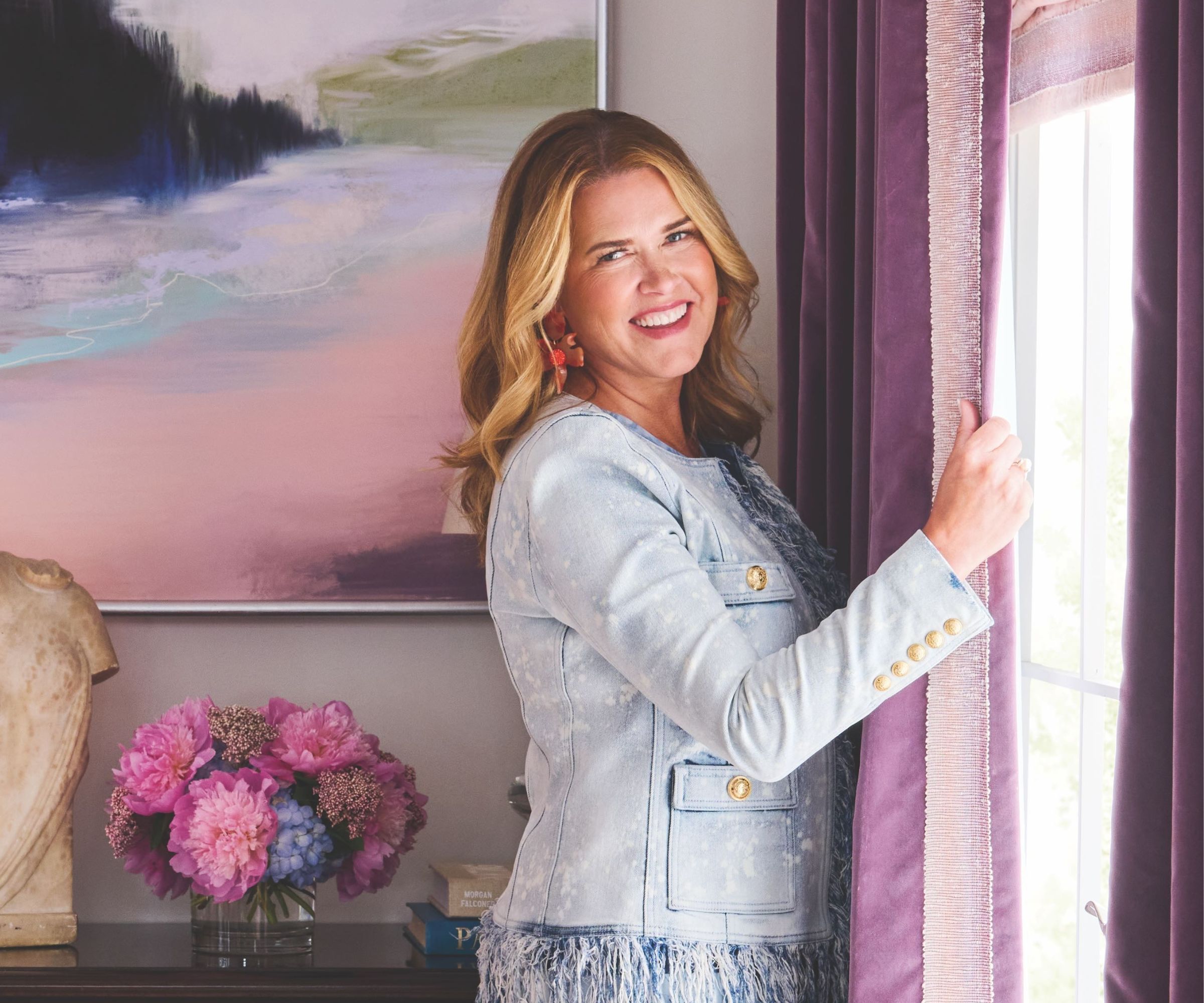
Kendall Wilkinson Design (KWD) creates bespoke residences with an emphasis on beauty and comfort. With a foundation of classic design sensibility, Kendall’s style continues to evolve with every project she engages.
4. Bring in bold colors, graphic shapes and pattern
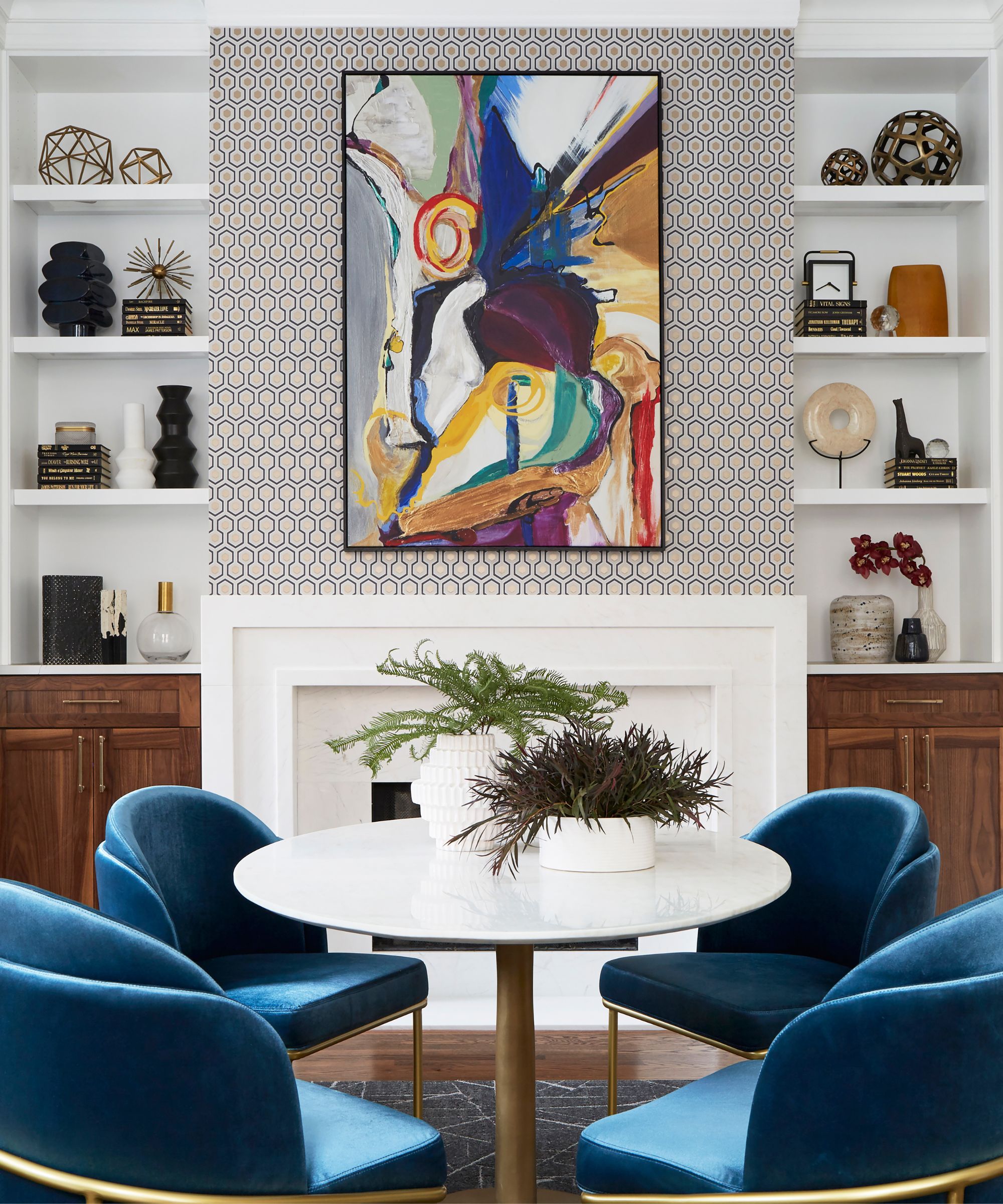
'When we are working with a client that would like to repurpose an existing item into their new design, we first and foremost have a discussion about how the item could impact the overall design and aesthetic of the space,' says designer Mark Schubert of Phillip Harrison Interiors who created the bold eat-in kitchen, pictured above, by introducing strong shapes, patterns and colors against the backdrop of a traditional fireplace and alcove set-up.
'We enjoy the juxtaposition of mixing old with new whether it be furnishings or architectural details,' he adds, 'and we want to create a space that is the representation of our client. Sometimes, it can be as easy as adding more contemporary décor. For instance, adding updated hardware or refinishing a piece of furniture to become a bit more contemporary through a color.'
Don't overlook the power of decorating with patterns to draw together the different elements of your transitional decorating ideas. The wallcovering here acts as a bridge between the strong contemporary dining furniture and the elegant period details of the room's architecture.

Mark is the founder and principal designer of Chicago-based firm Phillip Harrison Interiors; where he pushes creative limits, mixing elements to create an aesthetically pleasing and livable environment
5. Link old and new with a modern reflection of original features
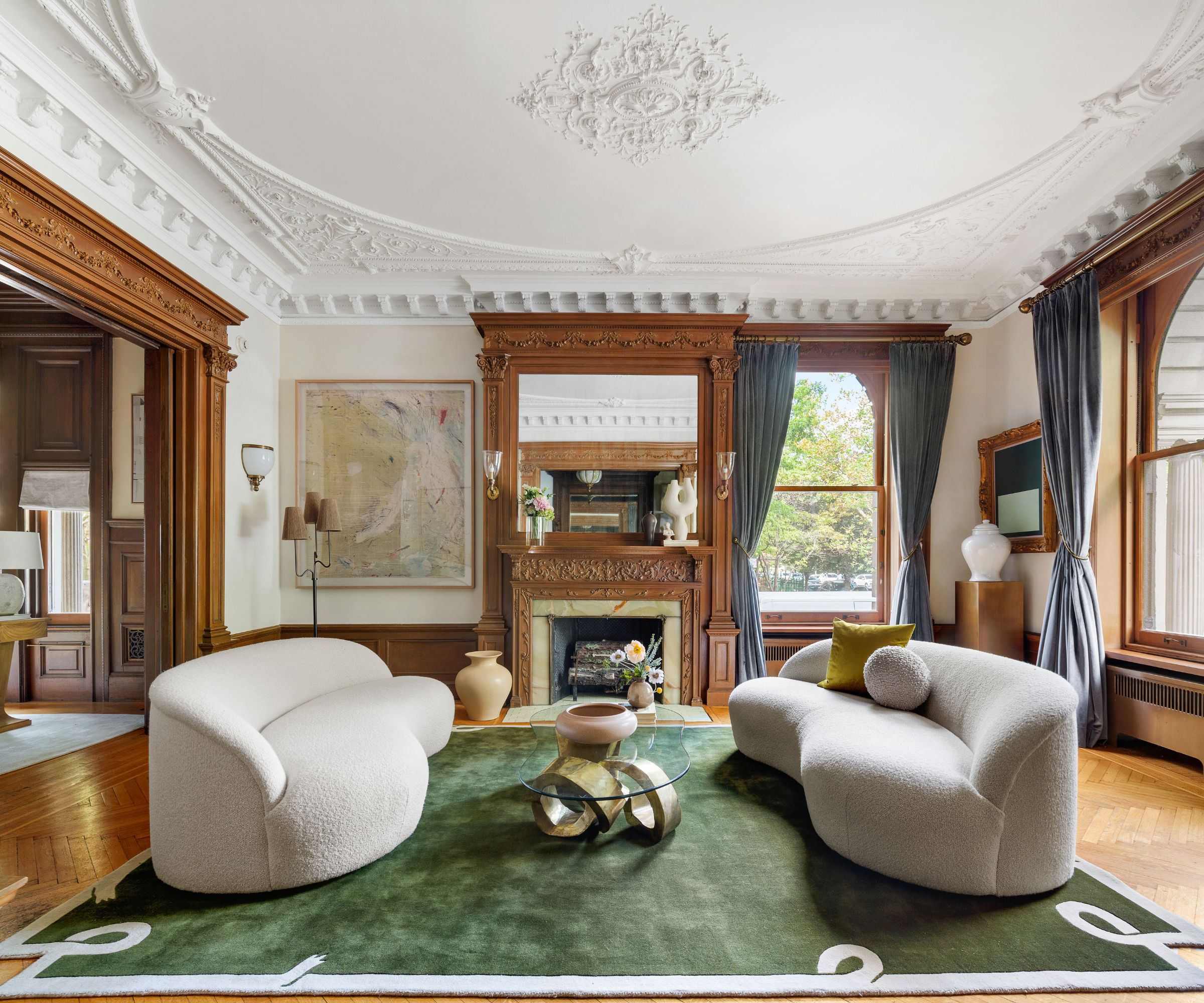
Sometimes a home's architectural features and period detailing are so striking that it can be difficult to know how to balance the interior design. This Neo-Italian Renaissance mansion in Brooklyn, designed by architect Montrose Morris and built in 1898, presented just such a problem prior to being put on the market.
Jason Saft of Staged to Sell Home was called in to reinvent the interiors, including this intricately detailed formal living room or parlor. To lighten up the heavy dark wood paneling, he introduced a lot of creams, beige and white. 'I used sculptural pieces to pair with the sculpted surroundings,' says Jason. 'And I also wanted to juxtapose the traditional setting with modern and transitional furniture, art and accessories. This approach can anger purists of traditional design, but part of my design process is to consider the home being presented to a wide audience whose tastes and preferences vary.'
The room's heavily embellished original moldings and paneling might not be to everybody's tastes, but we think by echoing those details with sculptural, modern furniture and furnishings Jason has given the room some breathing space and broadened the home's appeal to prospective buyers. We especially appreciate how he's used the knotted motif in the area rug and in the coffee table base to reflect the swag detailing in the ceiling molding.
'I wanted to create a sense of respecting the past, living to preserve it for the next generation, but also enjoy it in the present day with modern comforts,' adds Jason.
The finished space is a masterclass in transitional decorating.
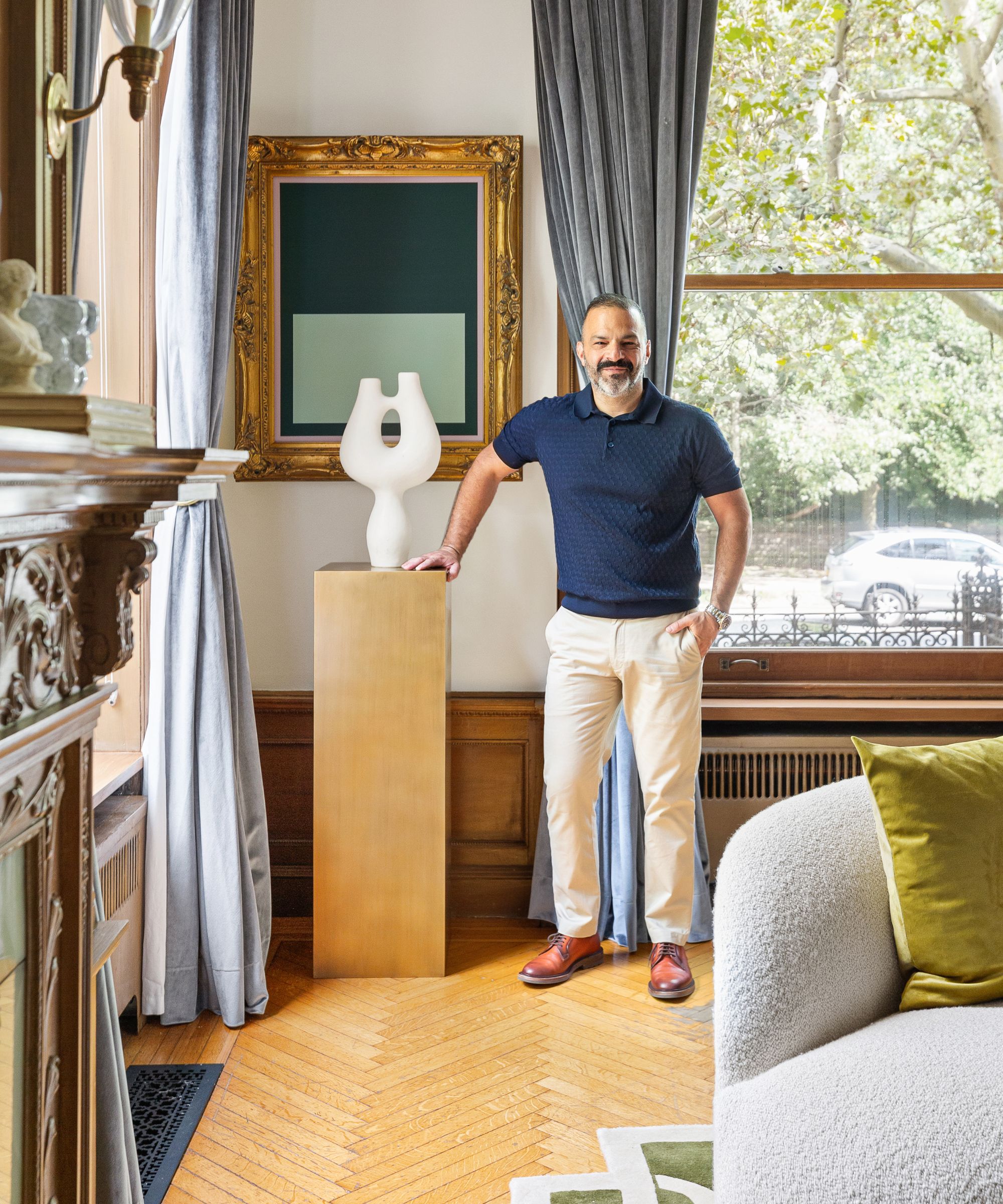
Staged To Sell Home is a leading boutique staging firm in New York City. Jason excels at transforming a space from what it is to what it should be, in order to achieve the highest return for his sellers and to help buyers see opportunity. With almost 20 years of expertise, the firm offers a cost-effective solution to yield high-return results.
6. Look to artworks and sculptures to add heritage to a contemporary kitchen
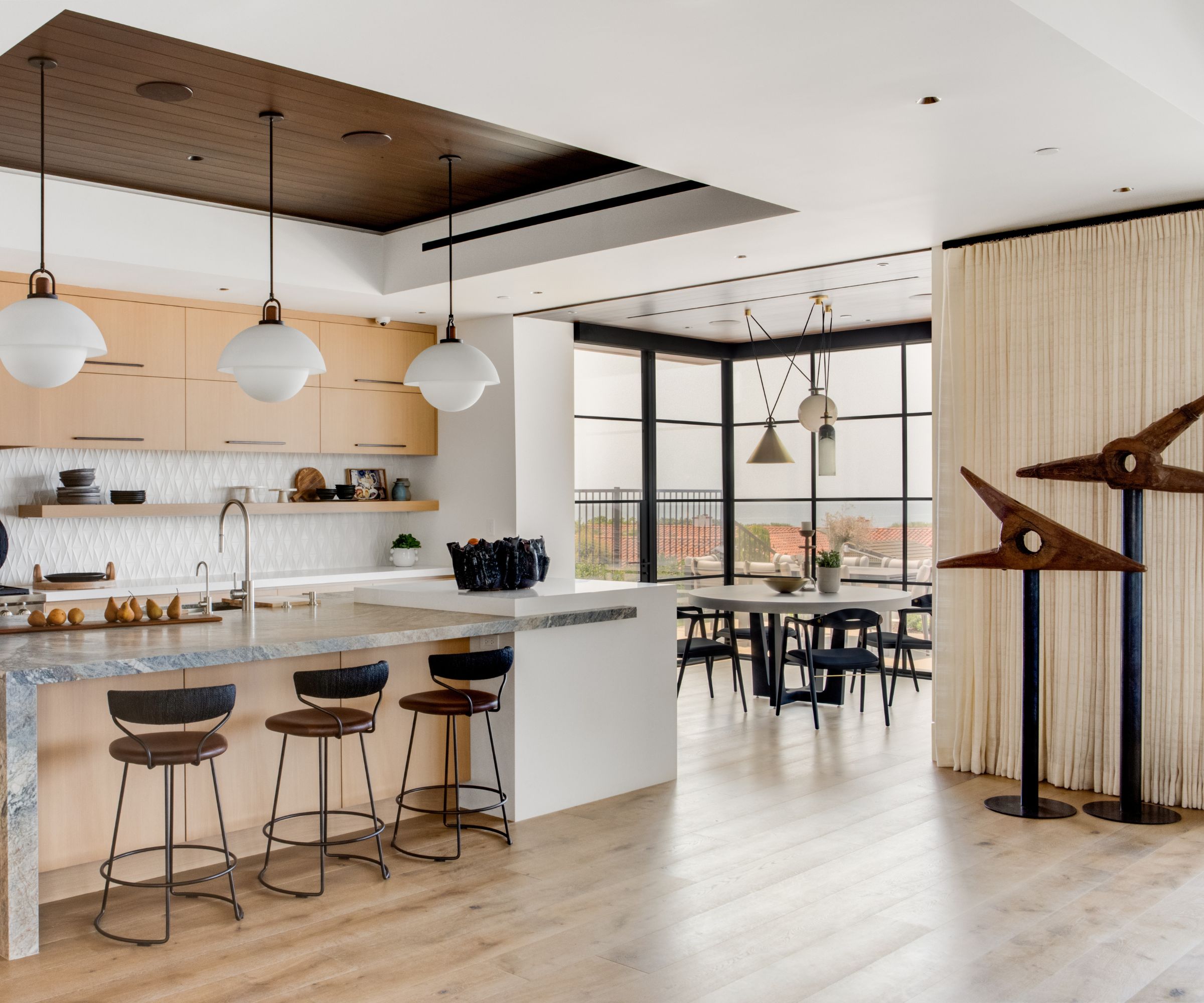
In a contemporary and clean-lined open-plan family room or great room setting it's worth making space for some more traditional or classic furnishings or accessories. These pieces will add to the room's story and just as we've seen in the other rooms around the house, will help to create a more layered look.
Denise Morrison of Morrison Interiors, who designed the family room above, says: 'Transitional design embodies a blend of traditional and contemporary styles, resulting in spaces that feel balanced. In this home, we integrated a vintage wood sculpture into a modern great room, achieving a cohesive and visually striking aesthetic. Its aged craftsmanship brings a sense of warmth and authenticity to the modern surroundings. By blending the best of both worlds, transitional decorating schemes offer warmth, versatility, and a sense of timeless elegance.'
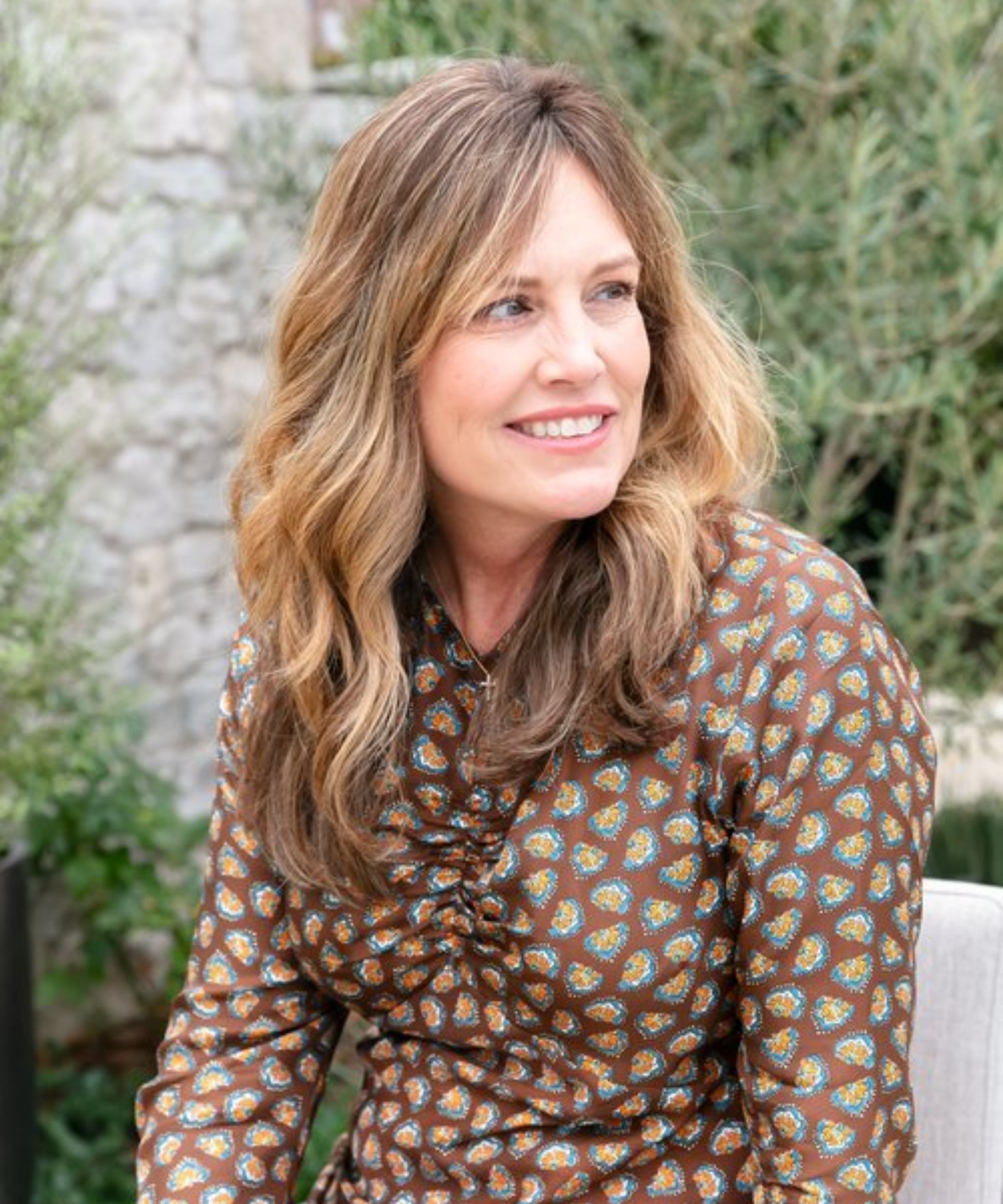
Denise studied at Cal State Fullerton, where she learned her trademark design principle: tension. A beautiful antique with a modern sofa. A vibrant painting in a cool, minimal living room. It’s this tension and balance between design elements that sets the framework for unforgettable design.
7. Try old and new side by side in a foyer
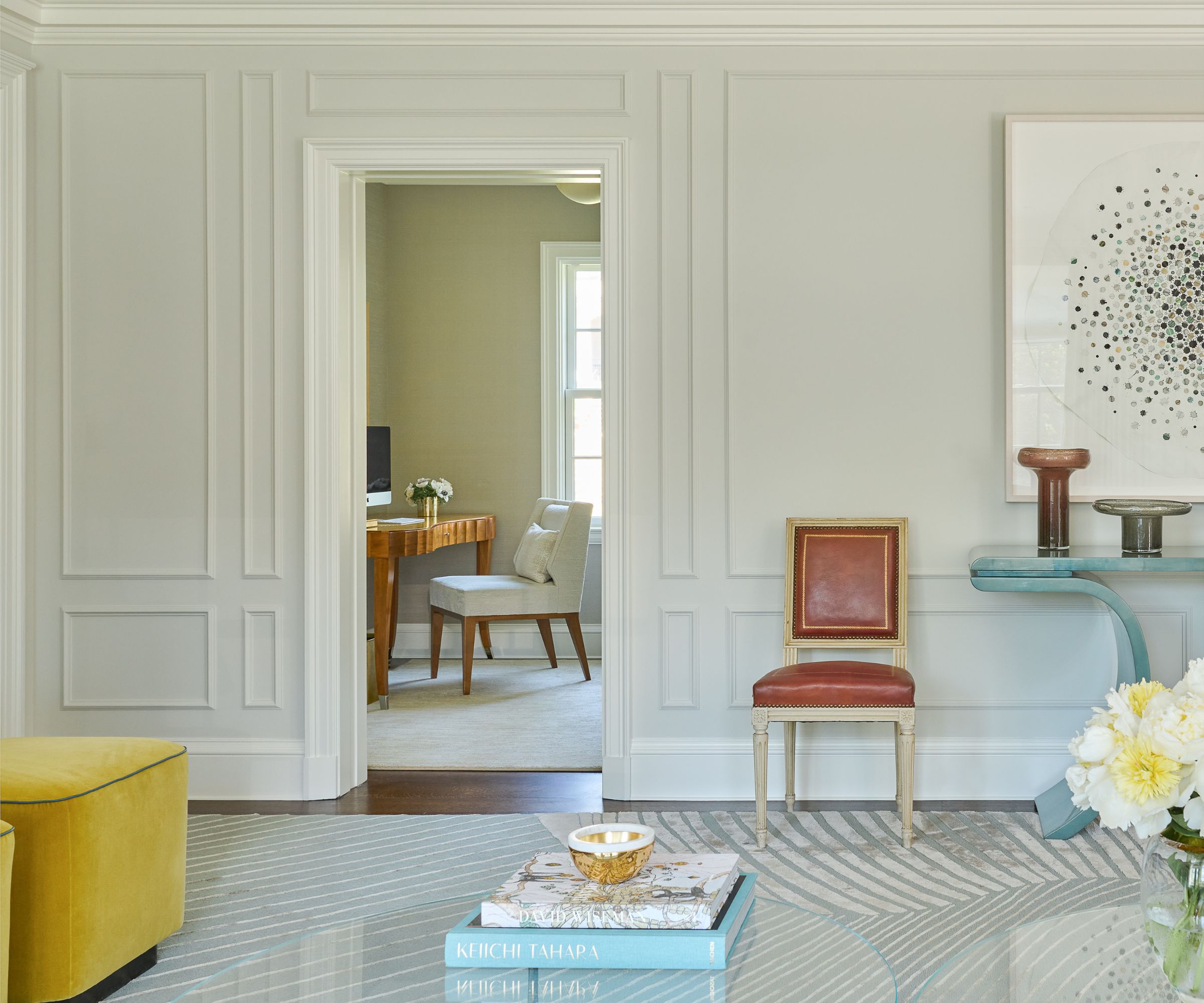
Hallways are a great place to showcase transitional decorating ideas, and whether it's an imposing formal space or a bright and welcoming entrance like this one, combining modern and traditional elements will help to create a good first impression on visitors.
'For a striking transitional look, we combined a pair of Louis XVI-style chairs with a modern Karl Springer mid-century lacquered parchment console table, creating a wonderful contrast of periods, finishes, and colors,' says designer Michelle Morgan Harrison, who designed the space.
Morgan Harrison Home is a full-service firm specializing in construction, renovation, and full home design. Michelle and her team work closely with each client to thoughtfully create fresh and livable environments that beautifully embrace their personal style and each family’s day-to-day needs.
8.Pair bright, modern upholstery with classic antiques
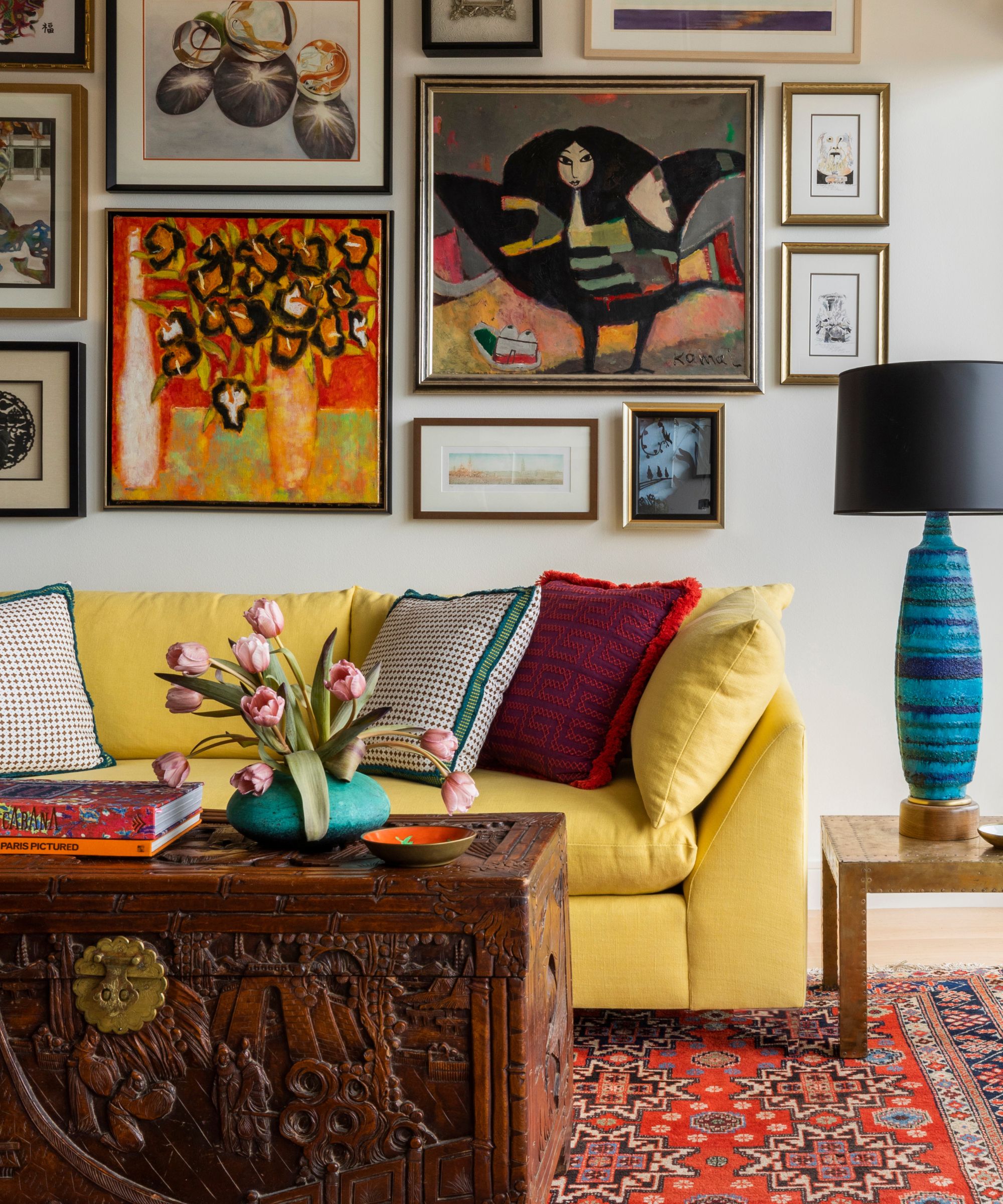
We've already explored the idea of introducing contemporary shaped sofas to a room to balance traditional elements around them but it's the bright contemporary color of the sofa that's doing the work in this room's transitional decorating ideas.
'I love elevating a space by using more modern upholstery pieces with antique and more traditional side tables and rugs,' says designer Emily Spanos, who devised the look. 'Antique rugs and dark wood furniture can feel dark and dreary; however, pairing the pieces with a modern sofa infuses the space with renewed charm and character.'
Decorating with antiques as part of a balanced room design, like this one, is a much more relaxed, current and family-friendly way to enjoy these heritage pieces. Maybe that's why we're all talking about transitional decorating ideas.

Emily June Spanos of Emily June Designs has a passion for color — and knows how to use it. A wild card in the Houston design scene, Emily is admired for her extraordinary ability to blend texture, pattern, and color in the most unexpected ways.
Transitional decor ideas are ideal for creating a home that never dates. By not leaning too much into one style or trend, you can design rooms that always feel current, and yet classic too. There's no right or wrong with transitional style, just stick with pieces you love and try what works together, and over time you will have spaces that feel chic, yet not overly considered.
Karen sources beautiful homes to feature on the Homes & Gardens website. She loves visiting historic houses in particular and working with photographers to capture all shapes and sizes of properties. Karen began her career as a sub-editor at Hi-Fi News and Record Review magazine. Her move to women’s magazines came soon after, in the shape of Living magazine, which covered cookery, fashion, beauty, homes and gardening. From Living Karen moved to Ideal Home magazine, where as deputy chief sub, then chief sub, she started to really take an interest in properties, architecture, interior design and gardening.
